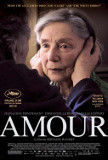Amour (Austria/France/Germany, 2012)
December 24, 2012
Films can be tremendous vehicles for escapism - paths to freeing oneself from worldly concerns and considerations. They can also be a means of getting in touch with essential elements of humanity such as love, sacrifice, and mortality. Those three aspects of the so-called "human experience" form the foundation of Michael Haneke's emotionally challenging Amour. Although not claiming to be based on a true story, Amour draws on details from Haneke's life. Many viewers will find echoes of their grandparents, parents, or even themselves in these characters.
In principle, I have no problem with melodrama. Many of my favorite films fit snugly into that category but it's the kind of thing Haneke apparently detests. Amour is emotionally powerful, but attains its power through a spare, non-manipulative chronicle of events in the lives of an elderly couple. At no time is an attempt made to wring tears from the audience. There may be crying but that's because there's a universal sadness to the story. The reason viewers are apt to react strongly to Amour is because it hits close to home. Its realism is its most obvious strength.
Haneke, who has a reputation for making abstruse films (his previous efforts include the Oscar-nominated The White Ribbon), takes a straightforward and unambiguous approach with Amour. It is in many ways his most accessible feature in recent years. It also makes excellent use of Haneke's "no frills" filmmaking approach. The director could be considered an anti-"shaky cam" filmmaker. He plants his camera on a tripod, points it in one direction, and allows it to capture whatever occurs in front of it. This sometimes results in actions taking place outside the field of view and there are instances when the camera "stares" at an empty room or hallway. Haneke uses long takes and reserves close-ups for special occasions.
Amour's story focuses on married octogenarians Georges (Jean-Louis Trintignant) and Anna (Emmanuelle Riva), retired music teachers who are enjoying a comfortable middle-class existence. After Anna suffers a mild stroke, her doctors suggest she undergo an operation to prevent a recurrence that could be more damaging. The operation is not successful, however; Anna is paralyzed on her right side. She despises being dependent upon Georges and talks of wanting to die. Georges, however, is resolute in his decision to care for his wife and not place her in a nursing home. Then Anna has a second, more debilitating stroke.
It goes without saying that, for a movie with such a simple narrative and austere directorial style, Amour places a heavy burden on its actors. Both are accomplished thespians. Jean-Louis Trintignant rose to fame during the 1960s and was one of the leading actors of the French New Wave; in terms of recent work, he is best remembered for his part in Krzysztof Kieslowski's Three Colors: Red. Emmanuelle Riva made her feature acting debut in 1959's Hiroshima, mon amour and was also featured in Kieslowski's Three Colors (Blue). These two acting greats give tremendously natural, nuanced performances that are on par with anything seen in a 2012 feature, English-language or non-English language. In a relatively sparse Lead Actress field, there's no doubt that Riva deserves a nomination. Although Trintignant is equally deserving, the Lead Actor field is more crowded. Isabelle Huppert, who has a long history working with Haneke, is effective in the supporting role of Georges and Anna's adult daughter, Eva.
Amour suffers from some pacing issues, although these are largely the result of Haneke using "dead space" (such as a sequence in which his camera spends an inordinate amount of time focused on paintings or an interminable scene in which Georges attempts to capture a pigeon that has entered his home) to establish a tone or develop a character. There are times when it can be argued that Haneke slows things down too much. The overall effect, however, is remarkable: Amour is unmatched in the 2012 foreign language market for its ability to resonate with its audience.
Although predominantly a tragedy about the end of life, Amour also makes a profound statement about what constitutes true love. Romantic poets often equate sacrifice with some grand gesture; Haneke gets real with it. It's cleaning bedpans, rubbing on ointments to prevent bedsores, and changing diapers. It's suffering along with a loved one because they hurt and there's nothing you can do to ease their discomfort. And it's making decisions about the future when there really isn't one. This may sound depressing and, in a sense it is, but these things are part of life and Haneke conveys them with a simplicity that is heartbreaking.
Amour (Austria/France/Germany, 2012)
Cast: Jean-Louis Trintignant, Emmanuelle Riva, Isabelle Huppert
Screenplay: Michael Haneke
Cinematography: Darius Khondji
Music:
U.S. Distributor: Sony Classics
U.S. Release Date: 2012-12-19
MPAA Rating: "PG-13" (Nudity)
Genre: DRAMA
Subtitles: In French with English subtitles
Theatrical Aspect Ratio: 1.85:1
- Three Colors: Red (1994)
- Z (1969)
- (There are no more better movies of Jean-Louis Trintignant)
- (There are no more worst movies of Jean-Louis Trintignant)
- Lost in Paris (2017)
- Hiroshima mon amour (1959)
- (There are no more better movies of Emmanuelle Riva)
- (There are no more worst movies of Emmanuelle Riva)

Comments